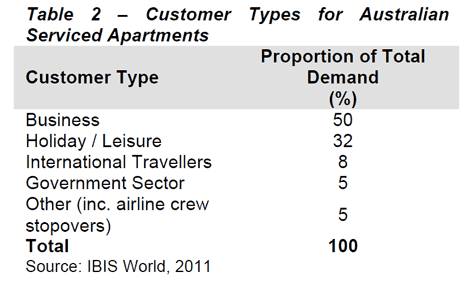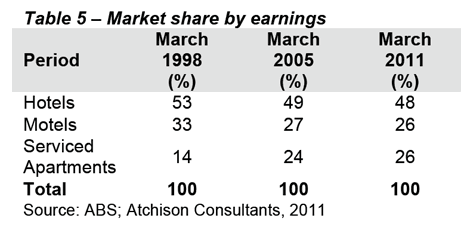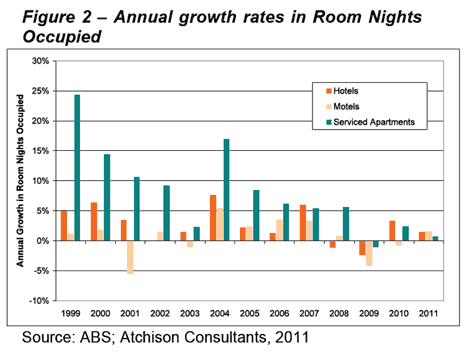Serviced apartments to outperform hotels in next three years: Atchison

The serviced apartments sector is forecast to outperform the hotel sector over the next three years, according to the latest Serviced Apartments Review by Atchison Consultants.
Atchison Consultants is forecasting total returns of between 13% and 15% per annum on an ungeared basis for serviced apartments, while total returns for hotels are expected to range between 10% to 11% per annum.
“Rental growth in line with CPI is expected [for serviced apartments]. Occupancy rates will reflect growth in GDP, which will remain positive,” says the report.
However a seperate report by Jones Lang LaSalle Hotels (JLLH) says "mum and dad" investors are cautious about investing in serviced apartments due to the negative economic outlook and negative yield spread on new projects under construction.
According to JLLH there 3,712 hotel rooms under construction at the end of September last year of which about a third were serviced apartments.
JLLH's managing director of strategic advisory Troy Craig says serviced apartments would have to show a positive yield spread for at least three years to tempt back retail investors.
On the other hand he says the growth in the apartment-style product shows consumer eagerness to "trade location for space, if offered at a similar price point" representing "an important trend for the industry, particurlarly given Australia's ageing hotel stock".
Paul Constantinou, chairman of Quest Serviced Apartments, which has the largest share of a very fragmented market (6%), says investors collectively own more than 5,000 individual Quest apartments.However, he says these investments have to date been “unstructured and very disparate”, sourced and sold through a channels ranging from real estate agents and financial planners to the developers themselves.
Quest has set up a specialist property investment arm called Quest Properties to help fund expansion of its portfolio and “wrestle back control.
“We are at the tipping point now where in order to grow at the rate required to meet corporate demand for our product we need a dedicated division to facilitate new investment in our business,” he says.
Constantinou says serviced apartments look and feel like residential investments, without the typical frustrations like vacancies, repair and maintenance obligations, body corporate charges and real estate agent and property management fees.He says the Quest offering promises a fixed 6.5% income return plus capital growth, no management fees and with maintenance managed by Quest.
“It’s a true set-and-forget investment,” he says.
The appeal of serviced apartments has also caught the eye of Harry Triguboff’s Meriton group, which plans to build 700 serviced apartments across Australia in 2012 and has recently acquired two sites in Sydney, which will include serviced apartments in the mix.
The sector is also set to benefit from increasing numbers of business travellers to Australia, which according to Atchison Consultants now account for 50% of guests who stay in serviced apartments.
Departure and arrival data from the ABS shows a 10% increase in the number of business travellers over the past year, with 845,000 coming in 2011 compared with 768,000 in 2010.
This is above the 10 year average annual rate of corporate traveller growth of 4.6%.

This growth in corporate visitors was highlighted this month by assistant RBA governor Philip Lowe, who said conditions were “noticeably stronger in the accommodation sectors in some of the large cities, which are benefiting from an increase in business travel and an apparent shift in preferences by overseas tourists for city-based experiences”.
According to BIS Shrapnel chief economist Frank Gelber, capital city hotels (which compete with serviced apartments) will be the best-performing commercial property sector in 2012.
“Why? In a nutshell because business travel has recovered. Both domestic and inbound,’ Gelber said in a column for The Australian.
“Performance of serviced apartments relies on continuing growth in corporate travel,” say Ken Smith and Ken Atchison, authors of the Atchison report.
“[The serviced apartments sector] has a competitive cost advantage over hotels as its nearest competitor in corporate accommodation, which is beneficial at a time when both business and consumer sentiment is fragile,” they say.
In line with a positive earnings trend, serviced apartments have attracted a growing share of the accommodation market.

In addition, demand for serviced apartments as measured by room nights sold was significantly higher than hotels and motels for years between 1999 and 2008, with the exception of 2007.
The number of room nights sold in serviced apartments as of 2011 was 3.3 million, representing a 72% increase since 2001.
Click to enlargeThe sector is highly fragmented, and no one player has a significant market share.
The biggest players are Quest (6%), Oaks Hotels and Resorts (5.7%), the Mantra Group (5.1%) and Mirvac (3.2%).
According to Atchison Consultants, since the beginning of 2009 occupancy rates have averaged above 80%, and this high occupancy is expected to continue in the absence of new supply.
While the sector dates back to the 1970s, the real growth spurt occurred in the build-up to the Sydney Olympics with the number of establishments with 15 rooms or more growing from 479 in 1998 to 973 by March 2011.
“Investment attributes of serviced apartments include direct property exposure with a relatively affordable price entry point usually on a long-term lease with contracted periodic rental uplift, tax and depreciation benefits and alternative use through conversion to residential,” says the Atchison Consultants review.
Under most arrangements the business risk is borne by the accommodation business, which leases the apartment from the investor with average lease terms spanning five to 10 years.
According to IBISWorld, as of 2011, the industry comprised more than 1,200 operators with more than 1,300 establishments. At the end of the 2011 financial year, the industry employed over 16,000 people, generating approximately $2.3 billion of revenue. The estimated value of the serviced apartment sector is $8 billion.
Property investors can participate in the serviced apartments sector by purchasing a strata title and leasing it to an accommodation business. Serviced apartments can also be incorporated as part of a self-managed super fund.
Photograph courtesy of Flickr.
